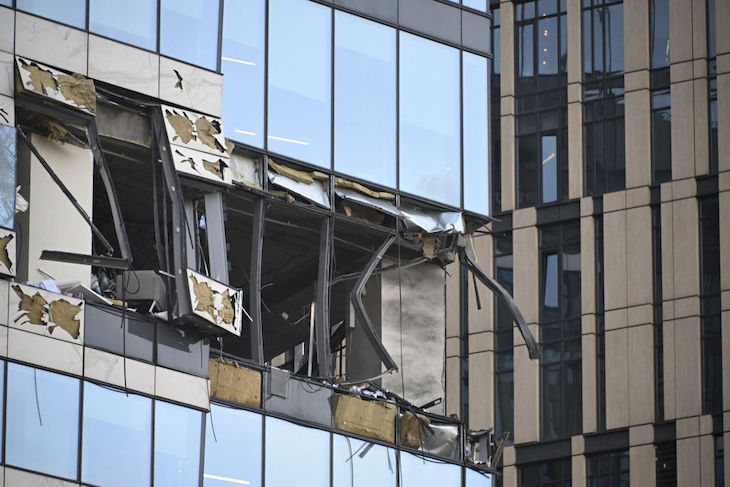Hours after Moscow was once again attacked by unmanned drones in the early hours of Sunday, Volodymyr Zelensky has declared that the war is turning back on Russia. Speaking in his daily video address, the Ukrainian president stated that ‘Russian aggression had failed on the battlefield’.
‘Ukraine is getting stronger,’ he continued. ‘Gradually, the war is returning to the territory of Russia – to its symbolic centres and military bases, and this is an inevitable, natural and absolutely fair process.’
This is the sixth drone attack on the Russian capital in three months and the latest incident appears to mark a significant departure in tactics for Ukraine. Until now, Kyiv has rarely acknowledged any attacks on Russia or Russian-annexed territories. Zelensky did not take responsibility for this latest incident, but his hint that the fight is coming to Russia suggests a new confidence among the leadership in Ukraine.
Muscovites are understandably fearful about drone attacks
Nearly three months ago, at the start of May following a drone attack on the Kremlin itself, Zelensky went as far as to state that: ‘We don’t attack Putin or Moscow. We fight on our territory’.
His latest comments hardly amount to any claim of responsibility for the spate of drone strikes on the Russian capital since then. But endorsing these strikes as ‘inevitable, natural and absolutely fair’ is the closest he, or his cabinet, have come to admitting that Kyiv, or those sympathetic to and supported by the regime, may have a hand in what happened.
Three drones were fired on Moscow, one of which was shot down in the Odintsovo district on the outskirts of the capital, according to the Russian ministry of defence. Two other drones managed to reach the city’s financial district, Moscow City, striking two office blocks. One of the buildings is the IQ-Quarter building, home to the ministries of industry and trade, economic development and communications. In the subsequent hours, passers-by reported finding government documents strewn on the pavement outside the building after they had been carried out of the ministries’ offices by the collision. A security guard who was on night duty at the time is said to have been injured in the incident. Another building struck by the drones, the 49-storey Oko-2 tower, is home to offices belonging to Yandex, Russia’s domestic equivalent to Google.
Muscovites are understandably fearful about drone attacks: some have said they have started avoiding the city’s landmarks out of fear of being hit, while others say they are desperate to leave Moscow or indeed Russia. Contrary to the Kremlin’s best efforts, Putin’s invasion does indeed have consequences for even the most privileged part of Russia.







Comments